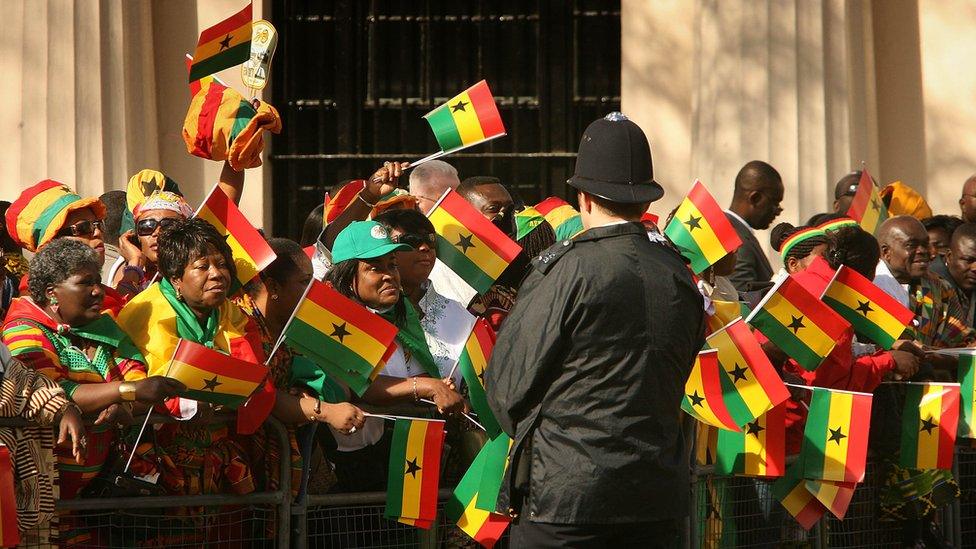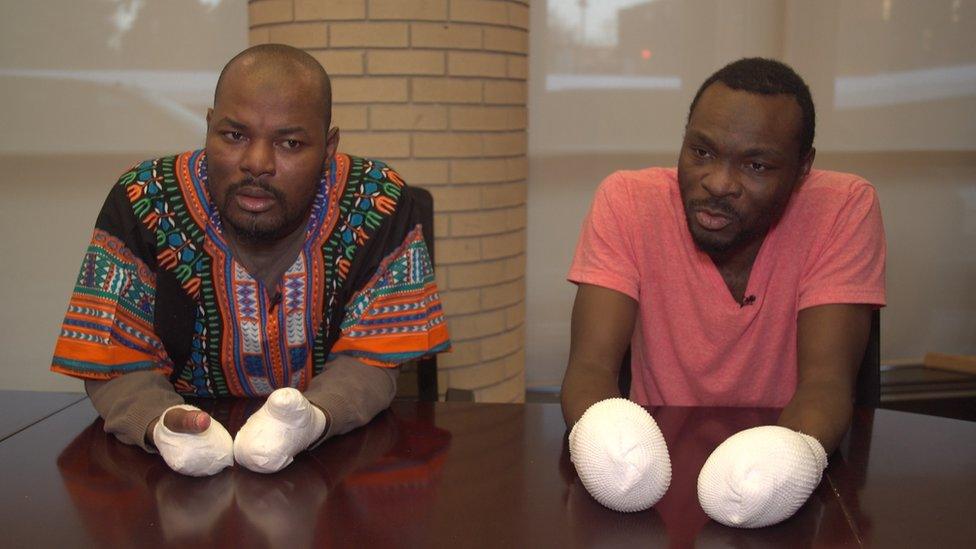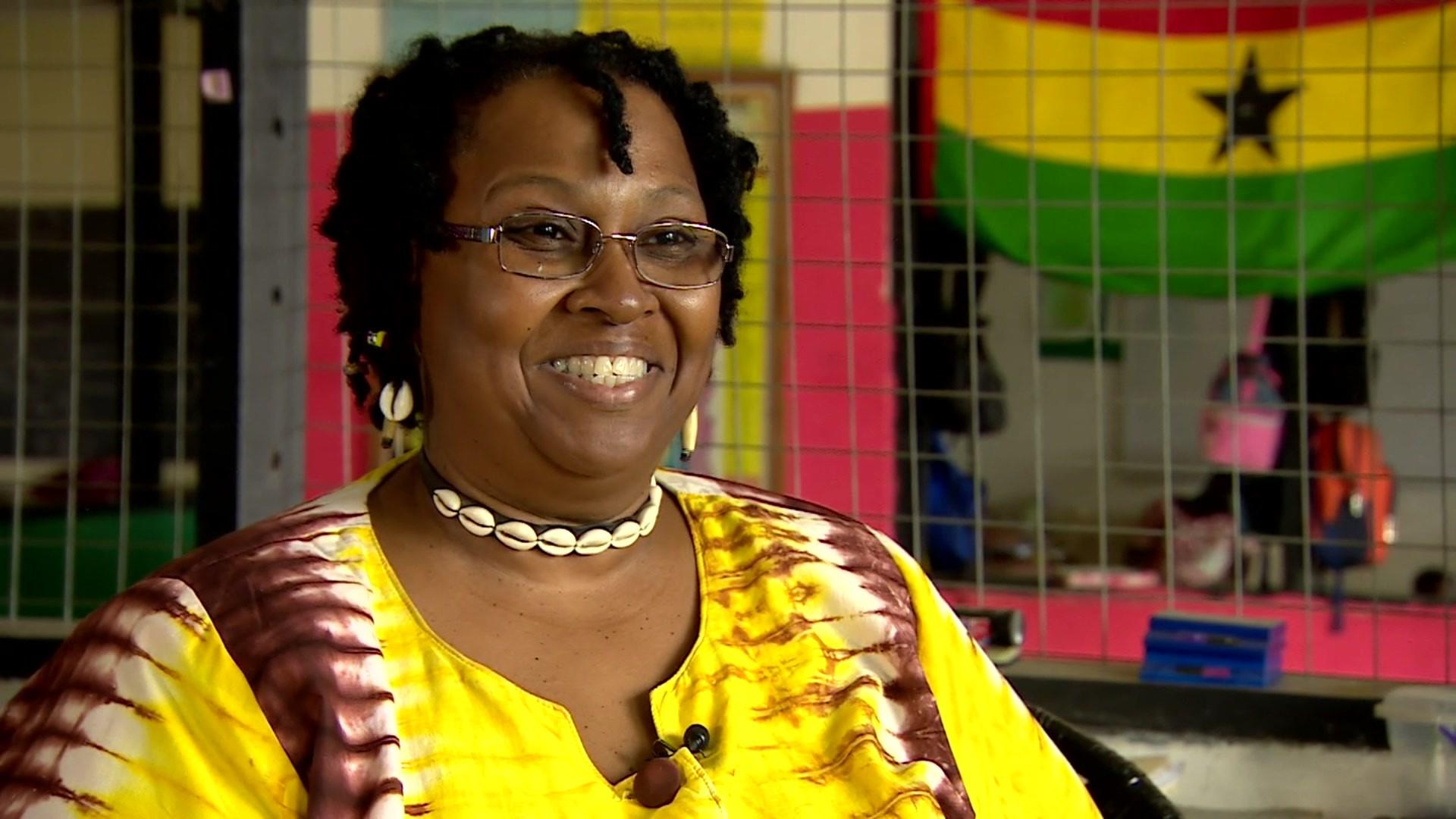Letter from Africa: Why do Ghanaians leave home?
- Published
'I lost all my fingers': Ghanaian asylum seekers in dangerous crossing
In our series of letters from African journalists, Elizabeth Ohene considers Ghanaians' wanderlust as her compatriots join those taking risks to claim asylum abroad.
We used to call them "Been-Tos" - that was the name for people who had travelled abroad.
The emphasis of course was on the fact that they went to foreign countries and came back home.
For a long time, the favourite destination was the United Kingdom; people often went there to study.
Up until the 1970s, the majority of Ghanaians who went abroad, especially to European countries, went to study and they came back to Ghana after finishing their studies.
Things began to change in the 1970s, when the economy collapsed and the politics became unpredictable.
Fewer and fewer of those who went to study came back and many others went abroad not to go and study but to live.
Being Ghanaians they never really called themselves immigrants, they were always going to go back home next year.

There are sizeable Ghanaian communities in every country around the globe
If you went into their homes, you would find their "Ghana trunk", which would be full of stuff they have been gathering to take back home with them when the time came.
That planned time to leave receded further and further as they had children and grandchildren and their children told their friends that their parents came from Ghana and they were from Tottenham in north London.
I remember meeting some Ghanaians in London back in 1983, who had been living in the UK for 32 years and never been back to visit and they still said they were planning to go "back home next year".
Their Ghana trunk was packed full of items of clothing bought during the summer sales over the years.
Visa-free travel
It sounds unbelievable to many young people around here today but Ghanaians used to travel to the UK and Germany and many other countries without needing visas.
As country after country imposed visa requirements on us, the stories started making the rounds about the lengths to which people would go to be able to leave Ghana.
One story in particular sticks in my mind.
The then-West German ambassador to Ghana told the story in 1980 of a young man whose application for a visa to visit West Germany had been refused.
An appeal was made to the embassy on behalf of the young man by the then vice-president of the republic who said the young man was his nephew.
The visa was granted and three weeks after the young man arrived in West Germany, the ambassador received a message that he had made an application for asylum on the grounds of political persecution.

Elizabeth Ohene:

"It has still been a sobering experience to see our country banded together with Somalia, Djibouti and Ethiopia"

We have gone through periods of political chaos and persecution.
We have gone through periods of shortages and extreme economic difficulties when Ghanaians were the butt of mockery and jokes because our luggage was full of soap, toilet roll and cooking oil when we travelled.
We know there are sizeable Ghanaian communities in every country around the globe.
We prefer to concentrate on the many professionals.
They are engineers, medical doctors and professors - after all Kofi Annan, the former UN secretary general was one of ours.

Ghana's Kofi Annan, the ex-UN chief, now chairs The Elders group of leaders working for peace
We know there are many Ghanaians who have "difficulties with paper" as we delicately call those whose status is illegal.
We Ghanaians are loud in trumpeting our difficulties.
All the same we have been stunned here by the story of the two Ghanaian asylum seekers who were frostbitten and lost their fingers and toes as they tried to cross in the winter snow from North Dakota in the US into Canada.
One man said he feared being deported back home because he was bisexual.
That came as a surprise here because even though gay sex is illegal in Ghana, it is not known that people are prosecuted for their sexuality.
But it has still been a sobering experience to see our country banded together with Somalia, Djibouti and Ethiopia.
These are countries we consider as places of regular famine and oppression.
It turns out Ghanaians belong among the desperadoes of the world.
We who live here are looking at ourselves anew.

More from Elizabeth Ohene:

Follow us on Twitter @BBCAfrica, external, on Facebook at BBC Africa, external, on Instagram at bbcafrica, external or email africalive@bbc.co.uk , external


- Published13 February 2017

- Published27 November 2015

- Published26 November 2015
